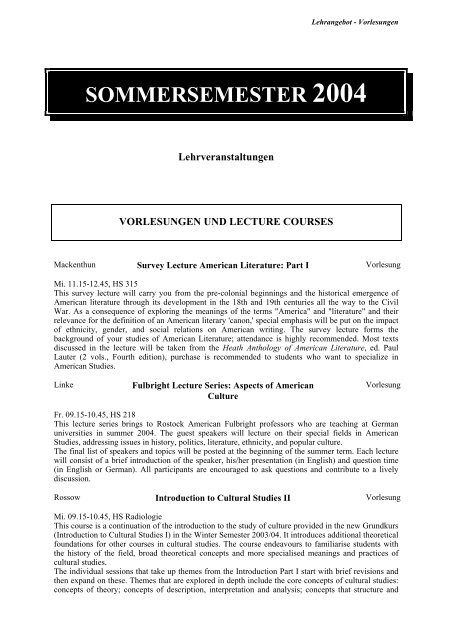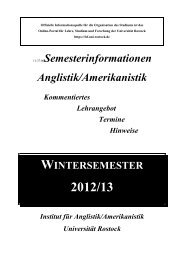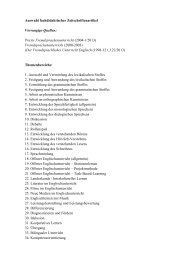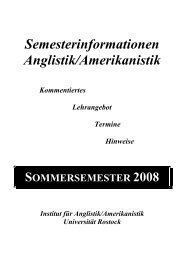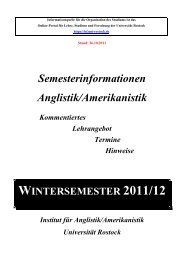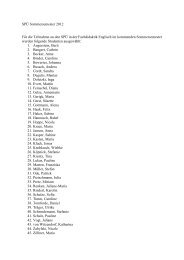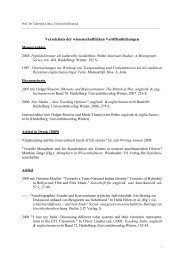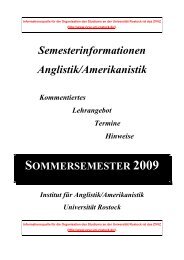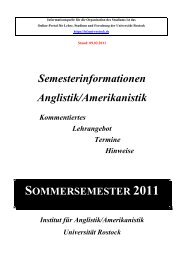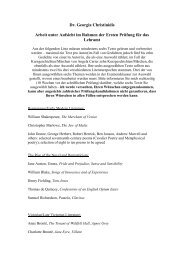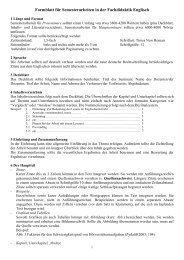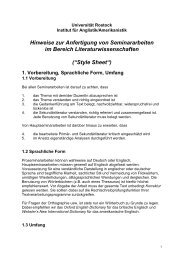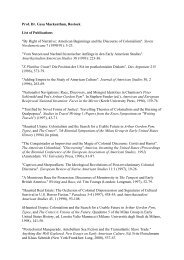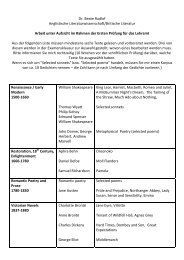SOMMERSEMESTER 2004 - Institut für Anglistik/Amerikanistik
SOMMERSEMESTER 2004 - Institut für Anglistik/Amerikanistik
SOMMERSEMESTER 2004 - Institut für Anglistik/Amerikanistik
Create successful ePaper yourself
Turn your PDF publications into a flip-book with our unique Google optimized e-Paper software.
Lehrangebot - Vorlesungen<br />
<strong>SOMMERSEMESTER</strong> <strong>2004</strong><br />
Lehrveranstaltungen<br />
VORLESUNGEN UND LECTURE COURSES<br />
Mackenthun Survey Lecture American Literature: Part I Vorlesung<br />
Mi. 11.15-12.45, HS 315<br />
This survey lecture will carry you from the pre-colonial beginnings and the historical emergence of<br />
American literature through its development in the 18th and 19th centuries all the way to the Civil<br />
War. As a consequence of exploring the meanings of the terms "America" and "literature" and their<br />
relevance for the definition of an American literary 'canon,' special emphasis will be put on the impact<br />
of ethnicity, gender, and social relations on American writing. The survey lecture forms the<br />
background of your studies of American Literature; attendance is highly recommended. Most texts<br />
discussed in the lecture will be taken from the Heath Anthology of American Literature, ed. Paul<br />
Lauter (2 vols., Fourth edition), purchase is recommended to students who want to specialize in<br />
American Studies.<br />
Linke<br />
Fulbright Lecture Series: Aspects of American<br />
Culture<br />
Vorlesung<br />
Fr. 09.15-10.45, HS 218<br />
This lecture series brings to Rostock American Fulbright professors who are teaching at German<br />
universities in summer <strong>2004</strong>. The guest speakers will lecture on their special fields in American<br />
Studies, addressing issues in history, politics, literature, ethnicity, and popular culture.<br />
The final list of speakers and topics will be posted at the beginning of the summer term. Each lecture<br />
will consist of a brief introduction of the speaker, his/her presentation (in English) and question time<br />
(in English or German). All participants are encouraged to ask questions and contribute to a lively<br />
discussion.<br />
Rossow Introduction to Cultural Studies II Vorlesung<br />
Mi. 09.15-10.45, HS Radiologie<br />
This course is a continuation of the introduction to the study of culture provided in the new Grundkurs<br />
(Introduction to Cultural Studies I) in the Winter Semester 2003/04. It introduces additional theoretical<br />
foundations for other courses in cultural studies. The course endeavours to familiarise students with<br />
the history of the field, broad theoretical concepts and more specialised meanings and practices of<br />
cultural studies.<br />
The individual sessions that take up themes from the Introduction Part I start with brief revisions and<br />
then expand on these. Themes that are explored in depth include the core concepts of cultural studies:<br />
concepts of theory; concepts of description, interpretation and analysis; concepts that structure and
Lehrangebot -Vorlesungen<br />
order constructions of reality; concepts of social structure; concepts of spatial-cultural order; and<br />
concepts of temporal order.<br />
The second section is rather selective and is arranged around some of the key scholars, texts, sites and<br />
debates in the field of cultural studies that were not covered in the Introduction Part I. The main<br />
emphasis is on the exemplary application of the theory provided in the first section to concrete<br />
problems.<br />
Note: Previous attendance of the Grundkurs: Introduction to Cultural Studies is helpful but not<br />
essential.<br />
A Reader will be available from the Copyshop in Brunnenhof. Participants who are not already in<br />
possession of the following book are encouraged to buy Hartley, John (2002) Communication,<br />
Cultural and Media Studies. The Key Concepts, London and New York: Routledge. (ISBN 0-415-<br />
26889-3)<br />
Brock Maxims of Communication Vorlesung<br />
Mi. 09.15-10.00, HS Chemie<br />
In 1975, Grice published the article "Logic and Conversation", in which he laid out his ideas of a<br />
Cooperative Principle and maxims of effective communication: Quality, Quantity, Relation and<br />
Manner. Following him, many researchers formulated alternative maxims to grasp pragmatic<br />
regularities. Among them are politeness maxims and Relevance Theory. The lecture attends to this<br />
body of work, and to the overall question: What, in addition to the language system, makes<br />
communication work?<br />
Grice, H. P. (1975). "Logic and conversation", in: Cole, Peter / Jerry L. Morgan (eds.), Syntax and<br />
Semantics, volume 3: Speech Acts, New York / San Francisco / London, 41-58.<br />
Leech, G. (1983). Principles of Pragmatics, London / New York: Longman.<br />
Sperber, D. / D. Wilson (1986). Relevance, Communication, and Cognition, Oxford: Blackwell.<br />
Kornexl History of the English Language Vorlesung<br />
Di. 13.15-14.00, HS 10020<br />
This lecture charts the development of English from its beginnings up to the present day, exploring<br />
major changes in the fields of phonology and spelling, morphology, syntax, vocabulary and semantics.<br />
Special attention will be given to aspects of variation as well as processes of standardization and to the<br />
linguistic properties and extra-linguistic forces that have turned English into an international language<br />
of unique currency and status.<br />
Garbe Fundamentals of Grammar Lecture Course<br />
Mo. 09.15-10.45, HS 10020<br />
This course provides an introduction to the analysis of English sentences. This will include forms and<br />
structures of simple and complex sentences (finite clauses, infinitive and participle constructions) as<br />
well as syntactic functions of word groups and subclauses. It will also deal with the grammatical<br />
categories of the verb (mainly tense and aspect), which means discussing and practising the use of<br />
English verb phrases, and considering similarities and differences between English and German.<br />
Alexander, L.G. (1988) English Grammar, Longman.<br />
Greenbaum, S. and R. Quirk (1993) A Student's Grammar of the English Language, Longman.<br />
Greenbaum, S. (1991) An Introduction to English Grammar, Longman.<br />
Huddleston, R. (1990) English Grammar. An Outline, CUP.<br />
Siebold Spracherwerb und Englischunterricht Lecture Course<br />
Do. 09.15-10.45, HS 315<br />
Auch für Lehramt Grundschule und BA/MA (anstatt PS Approaches to Language Learning).<br />
Voraussetzung für die Teilnahme: vorherige Teilnahme am GK Sprachwissenschaft und Fundamentals<br />
of Grammar.<br />
Wie lernen Menschen Sprachen? Zunächst wird der Frage nachgegangen, wie Kinder ihre<br />
Muttersprache erwerben. Im Mittelpunkt des Seminars steht jedoch der Zweitsprachenerwerb.
Lehrangebot - Vorlesungen<br />
Darunter sind die Voraussetzungen sowie die Art und Weise zu verstehen, wie Menschen außerhalb<br />
und innerhalb des Klassenraums andere Sprachen als ihre Muttersprache erwerben. Das Seminar gibt<br />
eine Einführung in wichtige Fragestellungen, Methoden und Ergebnisse der<br />
Zweitsprachenerwerbsforschung. Das Schwergewicht liegt dabei auf möglichen Schlussfolgerungen<br />
für den Englischunterricht: Wie verhelfen die Erkenntnisse der Zweitsprachenerwerbsforschung zu<br />
Einsichten in Wege und Grenzen des beruflichen Handelns künftiger Englischlehrerinnen und -lehrer?
Lehrangebot - Grundstudium<br />
Grundstudium<br />
Literaturwissenschaft<br />
Klaus<br />
Grundkurs: Einführung in die britische und<br />
amerikanische Literaturwissenschaft A + B<br />
Übung<br />
Gruppe A: Mi. 09.00-11.15, R. 8023<br />
Gruppe B: Do. 09.00-11.15, R. 8023<br />
nur für Lehrämter<br />
Der Kurs möchte mit Grundbegriffen und zentralen Fragestellungen der Literaturwissenschaft unseres<br />
Faches vertraut machen, also in die Teilbereiche Literaturtheorie, Textanalyse und Literaturgeschichte<br />
einführen. Anhand von Werken aus unterschiedlichen Perioden, Gattungen und Kulturkreisen soll ein<br />
Eindruck von dem weiten Gegenstandsbereich der englischen und amerikanischen<br />
Literaturwissenschaft vermittelt und zugleich eine Anleitung zum Umgang mit Texten gegeben<br />
werden.<br />
Eine Sitzung beginnt üblicherweise mit der gemeinsamen Interpretation eines Textes und geht dann,<br />
darauf aufbauend, in eine systematische Informationsbereitstellung durch den Lehrenden über.<br />
Schmitt-Kilb<br />
Grundkurs: Einführung in die britische und<br />
amerikanische Literaturwissenschaft C<br />
Übung<br />
Dienstag: 9.15-10.45, HS 218<br />
nur für Lehrämter<br />
"Ohne Spaß am Lesen und ein ausgeprägtes Interesse an englischsprachiger Literatur ist das übliche<br />
Lesepensum im Bereich <strong>Anglistik</strong>/<strong>Amerikanistik</strong> nicht zu bewältigen - ohne begriffliche und<br />
theoretische Grundlagen bleibt die Freude an literarischen Werken sprachlos und läßt sich nicht<br />
mitteilen" (Ansgar und Vera Nünning, Grundkurs anglistisch-amerikanistische Literaturwissenschaft,<br />
Stuttgart 2001, S. 8). Teil 1, also Spaß und Interesse am Lesen und an der Literatur, müssen Sie<br />
mitbringen (ansonsten sind Sie hier grundsätzlich falsch)! Teil 2, die Einführung also in den weiten<br />
Gegenstandsbereich des Faches und in die Bereiche Literaturtheorie, Textanalyse und<br />
Literaturgeschichte, ist das Ziel des Kurses, das jedoch nur erreicht werden kann, wenn Sie Neugier<br />
und die Bereitschaft mitbringen, sich mit zunächst ungewohnten Fragestellungen auseinanderzusetzen,<br />
ein wissenschaftliches Vokabular anzueignen und anzuwenden sowie an theoretischen Konzepten (und<br />
Texten) "abzuarbeiten".<br />
Der Lohn ist die Erkenntnis, dass die wissenschaftliche Auseinandersetzung mit Literatur nach<br />
anfänglichen Hürden ebenso faszinierend sein kann wie das Lesen von Literatur! Die zu behandelnden<br />
Texte werden in Form eines Readers zur Verfügung gestellt. Zusätzlich werden wir den Roman Things<br />
Fall Apart des Nigerianers Chinua Achebe behandeln – kaufen und lesen!<br />
Der Kurs ist dreistündig; er setzt sich zusammen aus dem wöchentlichen Seminar (2-stündig) und<br />
einem für alle obligatorischen Blockseminar.<br />
Wallat American Gothic Tales Proseminar<br />
Di. 13.15-14.45, HG 229<br />
Gothic novels and tales can be defined as a type of romance, very popular in the 18 th century and at the<br />
beginning of the 19 th century, which has had a considerable influence on fiction since. Most Gothic<br />
novels were tales of mystery and horror, intended to chill the spine and curdle the blood. They<br />
contained a strong element of the supernatural and the now traditional 'haunted house' props. Often<br />
they were set in medieval castles which had a secret passage, a dangerous, winding stairway, a<br />
stupefying atmosphere of doom and gloom and a proper complement of spooky happenings. The
Lehrangebot - Grundstudium<br />
vogue of medievalism, sensationalism, and supernatural horrors was developed by Walpole's The<br />
Castle of Otranto (1746), M.G. Lewis's The Monk (1795); The Mysteries of Udolpho (1795) and other<br />
romances of horror by Ann Radcliffe, and later by Godwin and Mary Wollstonecraft Shelly. Their<br />
influence is to be seen in the work of E.T.A. Hoffmann, the Brontës, and Edgar Allan Poe.<br />
Said to be initially written in reaction to the sedate neoclassicism of earlier 18 th -century culture, the<br />
Gothic novel or tale survived into the 20 th century. For American novelists, strongly influenced by<br />
Charles Brockden Brown and Edgar Allan Poe, the Gothic genre remains an important means of<br />
accounting for the anger that erupts from the violation of the self by the world, and the American<br />
female Gothic tradition can be interpreted as a reflection of gendered experience of the female self<br />
responding to and often in conflict with the psychological, social, cultural, and physical structures<br />
within which she lives.<br />
This course tries to examine if and how modern American Gothic tales can be read as reflections of the<br />
"...terrors of the soul...", and to what extent they can be regarded as part of American literary tradition.<br />
The anthology of American Gothic tales is on order at the Thalia bookstore.<br />
Wallat<br />
19 th Century American Poetry: Walt Whitman and<br />
Emily Dickinson<br />
Proseminar<br />
Di. 09.15-10.45, HG 229<br />
Walt Whitman and Emily Dickinson, the two "literary giants" of early American poetry, found the<br />
subjects and materials for their work in their own experience and in their own locales. Walt Whitman,<br />
the self-proclaimed "bard of America", used bold images and symbols drawn from work day life to<br />
capture the American spirit. Emily Dickinson discovered the substance for her poems in the garden<br />
next to her house in Amherst, Massachusetts; in the small events of household life; in the depth of her<br />
inquisitive mind. Each in his or her own way brought the American experience and the American<br />
language into novels, poems, and essays that would shape American literature.<br />
Participants are asked to buy the following books:<br />
Casebook: A Collection of Poems by Emily Dickinson: New York: Heinle, 1998. [ISBN: 0155054872]<br />
Walt Whitman, Leaves of Grass, Oxford: Oxford University Press (The World's Classics)<br />
Wallat<br />
The 1930s: Literature, Art and Politics in an Angry<br />
Decade<br />
Proseminar<br />
Do. 09.15-10.45, HG 229<br />
The 1930s – the decade of the "Great Depression" – left a deep impact on the American nation. It<br />
brought an end to the "golden and roaring 1920s" and saw many Americans in deep despair and<br />
extreme poverty. Confronted with this social catastrophe, artists, intellectuals and politicians<br />
responded to it in various ways.<br />
This seminar will focus on how the "Great Depression" led to an immense upshot of social unrest and<br />
social protest. John Steinbeck's novels In Dubious Battle (1936) and The Grapes of Wrath (1939),<br />
together with short stories, paintings and documentaries (provided in a reader), will give an insight<br />
into this decade of unrest, despair, and struggle to preserve human dignity.<br />
The books are on order at the Thalia bookstore.<br />
John Steinbeck, In Dubious Battle (1936) and The Grapes of Wrath (1939)<br />
Mackenthun<br />
Thomas Pynchon, Vineland: A Case Study in<br />
Literary Criticism<br />
Proseminar<br />
Di. 11.15-12.45, R. 8028<br />
Thomas Pynchon's novels are often regarded as too complex for undergraduate study. This seminar is<br />
intended to disprove this prejudice by closely reading and discussing Vineland, one of Pynchon's more<br />
accessible novels. Set in Northern California, Vineland parodistically condenses a myriad of American<br />
and non-American themes, mocking well-protected American myths both 'right' and 'left,' and<br />
criticizing the complacency of the Reagan era. Students are required to purchase, and start reading<br />
during the term break, Pynchon's novel Vineland (Penguin edition, ISBN 0141180633; some copies on<br />
order at Weiland bookstore, others available from internet bookstores). A Reader with additional
Lehrangebot - Grundstudium<br />
materials will be made available at the beginning of term. Knowledge of Pynchon's novel The Crying<br />
of Lot 49 would be helpful.<br />
Sprachwissenschaft<br />
Bös Grundkurs Sprachwissenschaft Übung<br />
Do. 13.15-14.45, HS 218<br />
Ziel des Grundkurses ist es, einen ersten Überblick über die Teildisziplinen und wesentlichen Begriffe<br />
der Sprachwissenschaft zu geben. Es werden zunächst die kleinsten Einheiten im Sprachsystem, die<br />
Laute, beschrieben (Phonetik, Phonologie). Anschließend stehen Form und Bedeutung von Wörtern<br />
(Morphologie, Semantik) und die Analyse von Sätzen (Syntax) im Mittelpunkt der Aufmerksamkeit.<br />
Es werden außerdem Aspekte der Textanalyse, z.B. die Informationsverteilung im Satz (Thema-<br />
Rhema) sowie die Verknüpfung von Texten (Kohäsion) betrachtet.<br />
Darüber hinaus erfolgt auch eine Auseinandersetzung mit dem Gebrauch der Sprache in der aktuellen<br />
Sprechsituation. So werden Aspekte der sogenannten Sprechakttheorie diskutiert, die die Bedeutung<br />
und Wirkung von Äußerungen untersucht (Pragmatik). Ein weiterer interessanter Teilbereich ist die<br />
Soziolinguistik, die sich mit regional und sozial beeinflussten Sprachvarianten (z.B. Britischem und<br />
Amerikanischem Englisch oder Frauen- und Männersprache) befasst.<br />
N.N. An Introduction to Media Linguistics Proseminar<br />
Mo. 15.15-16.45, R. 8028<br />
This course will give a first overview of newspaper texts, advertisements, as well as TV talk shows. It<br />
will include an introduction of the historical development of newspapers and print advertisements, a<br />
description of types and structure of newspaper texts (with a special focus on news stories) as well as a<br />
discussion of structural elements and linguistic strategies observable in advertisements and talk shows.<br />
Ramin Major National Varieties of English Proseminar<br />
Mi. 13.15-14.45, R. 8023<br />
English has spread from a little island around the globe. Approximately 1.5 billion speakers use it as<br />
their first or second language or as a foreign language. The result is a multitude of varieties. In this<br />
seminar we want to find out how selected national varieties developed, and what makes each of these<br />
varieties so special. After a short introduction to sociolinguistic methodology, we will focus on the<br />
historical development of the English language on the British Isles, where everything started. Later we<br />
will set sail and travel westwards. Here, we will compare British English to the second major national<br />
standard, American English. In the southern hemisphere, the norm is set by Australian English, which<br />
will be investigated as well. As a second language, English functions as a semi-official variety, e.g. in<br />
India and Africa. Here the role of English as the language of media, education and politics will be in<br />
focus.<br />
A selected bibliography and a list of topics for presentations will be provided at the beginning of the<br />
course. For a first overview you may have a look at:<br />
Hansen, Klaus; Uwe Carls; Peter Lucko (1996), Die Differenzierung des Englischen in nationale<br />
Varianten, Berlin: Schmidt.<br />
Trudgill, Peter; Jean Hannah (1994), International English, 3 rd ed, London: Arnold.<br />
Ungerer<br />
Prototypes, Basic Level, Metaphors and Frames:<br />
How Language Reflects the World<br />
Proseminar<br />
Do. 11.15-12.45, R. 8023<br />
8 x 2 SWS + eintägige Blockveranstaltung<br />
The way we approach the world is through prototypes (or best examples) that mostly belong to the<br />
basic level (such as apples, cars, girls and boys, fire and journey); we try to use this basic kind of<br />
experience to explain more complex phenomena (emotions like anger or joy, abstract ideas like<br />
argument or education) by metaphors rooted in the basic level. With the help of these cognitive tools<br />
we build up frames or cognitive models of the world (e.g. the model of a city and what belongs to it).<br />
In this seminar we will explore this cognitive system and inquire how it is mirrored in the English
Lehrangebot - Grundstudium<br />
language, particularly in its vocabulary. The full day class (Blockveranstaltung), which will be held on<br />
a Friday or Saturday during term time, is conceived as a workshop dealing with the revision of the<br />
Introduction of Cognitive Linguistics. Among other things, we will try to identify weak spots in the<br />
1st edition, critically compare revised passages with original passages of the book, and assemble<br />
suggestions for extension and improvement. Participation in the Proseminar will be based on a<br />
Listeneinschreibung.<br />
Preparatory reading: Aitchison, Jean (1987 etc.), Words in the Mind, Oxford: Blackwell.<br />
Ungerer, Friedrich/Hans-Jörg Schmid (1996), An Introduction to Cognitive Linguistics, London:<br />
Longman (the latter as a preparation for the full day class).<br />
Brock Introduction to Middle English Proseminar<br />
Do. 13.15-14.45, R. 8028<br />
In this course, we read, translate and analyse Middle English texts. We discuss the social history of the<br />
period, as well as pronunciation, spelling, grammar, and the lexicon of Middle English. We also look<br />
at Middle English text types and pragmatic circumstances.<br />
Baugh, Albert C. / Thomas Cable (1993) – A History of the English Language, London: Routledge +<br />
seminar reader<br />
Burrow, John A. / Thorlac Turville-Petre (1996) – A Book of Middle English, Oxford: Blackwell.<br />
Markus, Manfred (1990) – Mittelenglisches Studienbuch, Tübingen: Francke.<br />
Brock English Morphology Proseminar<br />
Mi. 13.15-14.45, HG 229<br />
The words that we use are made up of morphemes. In this course, we classify morphemes (e.g. into<br />
lexical and grammatical ones), and look at how they combine with each other: We describe basic<br />
word-formation processes like compounding, affixation, clipping, acronyms, and phenomena like<br />
lexicalisation and blocking.<br />
Bauer, Laurie (1993) – English Word-Formation, Cambridge: Cambridge University Press.<br />
Hoppe Phonetics and Phonology Übung<br />
Do. 09.15-10.45, R. 7023<br />
This course is a single period combining lecture and practical exercises. The theoretical introductions<br />
are presented in the context of a general theory on speech sounds (phonetics) and how they function in<br />
the language (phonology). Main areas for practice in the language laboratory will include RP vowels<br />
and consonants, stress, intonation, rules for linking, reduction and the pronunciation of short texts.<br />
Highly individualized tapes are available for use in the classroom or at home. The course-book will<br />
prepare students to pass both the oral and written tests. It contains all of the necessary theory, a large<br />
number of exercises, a key, a glossary of phonetic terms, texts for transcriptions, and the texts of the<br />
cassettes, which can be loaned to the user upon request.<br />
Hoppe, R. (1990) English Phonetics and Phonology, Rostock (wird im Kurs ausgegeben).<br />
A Pronouncing Dictionary. Recommendations in the course.<br />
Hoppe Additional Phonetic Exercises A + B Übung<br />
Gruppe A: 08.00-08.45, R. 7023<br />
Gruppe B: Do. 08.00-08.45, R. 7023<br />
The prerequisite for this single period is that students have already attended the introductory course<br />
`English Phonetics and Phonology´ or the `Phonetic Communicative Competence Course ´. The<br />
practical exercises done here include reading texts with emphasis on intonation, transcribing texts<br />
(phonetically and tonemically), and correcting individual pronunciation errors.The credit can be used<br />
for the ‘wahlfreier Bereich’.<br />
Hoppe, R. (1990) English Phonetics and Phonology. Rostock (chapters 1-4 and bibliography).
Lehrangebot - Grundstudium<br />
Kultur Großbritanniens und Nordamerikas<br />
Rossow Grundkurs: Introduction to Cultural Studies I Übung<br />
Mo. 09.15-10.45, HS Radiologie<br />
This course serves as an introduction to the study of culture and provides some of the theoretical<br />
foundations for successive courses in cultural studies. The course is divided into two main sections.<br />
It starts with a brief outline of the origins of the field and its history. This outline will also discuss how<br />
changes in the meaning of culture pinpoint key shifts in the way we research society and have<br />
influenced the landscape of social research in various disciplines.<br />
Students will then be given accessible (easier said than done!) introductions to some of the core<br />
concepts of cultural studies: concepts of theory; concepts of description, interpretation and analysis;<br />
concepts that structure and order constructions of reality; concepts of social structure; concepts of<br />
spatial-cultural order; and concepts of temporal order.<br />
Each of the presentations of concepts is accompanied and supplemented by exemplary applications of<br />
the theory to concrete issues. The applications should, among other things, illustrate the usefulness and<br />
versatility of the methodological approaches and analytical tools provided by cultural studies.<br />
A Reader will be available from the Copyshop in Brunnenhof. Participants also have to buy<br />
Hartley, John (2002) Communication, Cultural and Media Studies. The Key Concepts, London and<br />
New York: Routledge. (ISBN 0-415-26889-3)<br />
Rossow Britannia Overruled - Decline or Adjustment? Proseminar<br />
Di. 07.30-09.00, R. 8023<br />
A century ago, Britannia still `ruled the waves´ and `straddled the globe´. Within twenty years of<br />
victory in the Second World War Britain had ceased to be a world power and her global empire had<br />
dissolved into fragments. Today, she is a peripheral member of the European Union. This course<br />
attempts to offer an explanation of this `decline´ (or `adjustment´?). It provides a survey of British<br />
overseas policy since the 1890s and examines the nature of power, and Britain’s economy, empire and<br />
international position. The objective is to reveal not only the limitations of British power in its<br />
Victorian heyday, but also the too-easily-underestimated extent of Britain’s continuing power into our<br />
own century.<br />
A reader with primary and secondary texts, a selected bibliography and the list of topics for term<br />
papers will be provided at the beginning of the course.<br />
Linke Views on Class in 20 th Century Britain Proseminar<br />
Mo. 13.15-14.45, R. 8023<br />
Since Britain has been considered the most class-ridden country under the sun (G. Orwell), class<br />
appears to provide a key to understanding British culture. This course will look at the social and<br />
cultural history of Britain in the 20th century through the eyes of sociologists and other keen observers<br />
of British society. The textual basis will comprise mainly non-fictional texts such as, for example,<br />
Wigan Pier (Orwell), political speeches and sociological descriptions from different decades. This<br />
one-term class cannot provide a comprehensive history of social classes but will rather focus on<br />
selected prominent issues such as Red Clydeside, the miners' situation, or social harmony in wartime.<br />
Susemihl The Canadian North Proseminar<br />
Di. 11.15-12.45, R. 7023<br />
The North is Canada – Canada is the North. It is its Northern image that distinguishes Canada from the<br />
United States in the eyes of many people who do not live in North America. But even to a Canadian<br />
the North seems to be more than a geographical region. It is an idea, a myth, a promise, a destiny, a<br />
world of imagination, and as such it has shaped Canadian identity. Throughout Canadian history and<br />
culture, ideas of the North have kept a firm hold on national consciousness. For a long time, however,<br />
the region was fairly unknown to most Canadians. Yet, as the nation struggles to understand this vast<br />
and diverse land, Northern issues are becoming national issues.<br />
This course intends to discover the Canadian North, its geography and history, political and economic<br />
development, cultures and peoples, using traditional primary documents (i.e. newspapers, letters,<br />
journals) as well as fiction, oral history, art, photography, and film. The course is a survey of the
Lehrangebot - Grundstudium<br />
history of northern Canada from the contact period to the present and will thus focus on major issues,<br />
themes, developments, and events in the three northern territories and the provincial north. A course<br />
reader will be available at the beginning of the course; further required literature can be purchased at<br />
the Thalia bookstore or at Amazon.de.<br />
Morrison, William R. True North. The Yukon and Northwest Territories. Oxford University Press,<br />
1998. (ISBN 0195410459)<br />
Richler, Mordecai. Solomon Gursky Was Here. New York: Penguin, 1989. (0099877309)<br />
Wallat<br />
The 1930s: Literature, Art and Politics in an<br />
Angry Decade<br />
Proseminar<br />
Do. 09.15-10.45, HG 229<br />
The 1930s – the decade of the "Great Depression" – left a deep impact on the American nation. It<br />
brought an end to the "golden and roaring 1920s" and saw many Americans in deep despair and<br />
extreme poverty. Confronted with this social catastrophe, artists, intellectuals and politicians<br />
responded to it in various ways.<br />
This seminar will focus on how the "Great Depression" led to an immense upshot of social unrest and<br />
social protest. John Steinbeck's novels In Dubious Battle (1936) and The Grapes of Wrath (1939),<br />
together with short stories, paintings and documentaries (provided in a reader), will give an insight<br />
into this decade of unrest, despair, and struggle to preserve human dignity.<br />
The books are on order at the Thalia bookstore.<br />
John Steinbeck, In Dubious Battle (1936) and The Grapes of Wrath (1939)<br />
Fachdidaktik und Vermittlungskompetenz<br />
Siebold Grundkurs: Grundfragen der Fachdidaktik Englisch Übung<br />
Mo. 11.15-12.45, R. 8023<br />
ab 3. Sem.<br />
Inhaltliche Schwerpunkte: Gegenstand und Bezugswissenschaften der Fachdidaktik Englisch;<br />
Unterrichtskonzeptionen; Ziele und Inhalte des Englischunterrichts; didaktisch-methodische<br />
Grundstrukturen der Arbeit an Kenntnissen und der Entwicklung sprachkommunikativen Könnens;<br />
Lernerorientierung im Englischunterricht.<br />
Siebold Grundkurs: Frühbeginnender Englischunterricht Übung<br />
Mi. 11.15-12.45, 14tägl., gerade Wochen, R. 8023<br />
Der Kurs soll einen ersten Überblick über die laufende Fachdiskussion zum Englischunterricht an<br />
Grundschulen vermitteln. Die gegenwärtige Situation sowie verschiedene didaktische Konzepte<br />
werden skizziert. Vor allem aber versucht der Kurs, theoretisches Hintergrundwissen zu geben und<br />
eine Lernen und Spielen gleichermaßen berücksichtigende Grundlinie des Unterrichtens zu entwerfen.<br />
Diese zeichnet theoriegeleitetes Handeln vor, ohne es jedoch vorzuschreiben.<br />
Hellwig, K. (1995) Fremdsprachen an Grundschulen als Spielen und Lernen, Ismaning: Hueber<br />
Verlag.<br />
Maier, W. (1991) Fremdsprachen in der Grundschule, München: Langenscheidt Verlag.<br />
Vale, D. and A. Feunteun (1996) Teaching Children English, Cambridge: Cambridge University<br />
Press.<br />
Eckert Study Tasks and Study Skills Übung<br />
Mo. 09.15-10.45, R. 8028<br />
This course is for students who want to learn how to study effectively in English. It is designed to extend<br />
the range of skills needed to begin and complete your studies successfully and to enhance your<br />
employment prospects. Structured and straightforward guidance is given on the following topics: note<br />
taking, gathering and using information, essay and report writing, oral presentation. An interactive
Lehrangebot - Grundstudium<br />
approach enables you to find out for yourself which study techniques are best suited to your own way<br />
of working. The classes will be accompanied by handouts and bibliographical references.<br />
Hoppe Phonetics and Oral Presentation Übung<br />
Di. 09.15-10.45, R. 7023<br />
This course is a single period combining lecture and practical exercises. The theoretical introductions<br />
are presented in the context of a general theory on speech sounds (phonetics) and how they function in<br />
the language (phonology). The main areas for practice in the language laboratory will include RP<br />
vowels and consonants, stress, intonation, rules for linking, reduction and the pronunciation of short<br />
texts.<br />
Highly individualized tapes are available to be used in the classroom or at home. The course-book will<br />
prepare students for both the oral and written tests. It contains all necessary theory, a large number of<br />
exercises, a key, a glossary of phonetic terms, texts for transcriptions, and the texts of the cassettes,<br />
which can be loaned to the user upon request.<br />
Hoppe, R. (1990) English Phonetics and Phonology, Rostock ( wird im Kurs ausgegeben).<br />
A Pronouncing Dictionary. Recommendations in the course.<br />
Sprachpraxis<br />
Towards Proficiency I bzw. II<br />
Übung<br />
1. Semester (die Zuordnung zu Top I bzw. II ist abhängig vom Ergebnis des Diagnosetests)<br />
Top I: 2 SWS + 2 ergänzende SWS<br />
Top II: 2 SWS<br />
This course, together with a number of skill-orientated courses offered, helps the students to develop<br />
and improve their English up to the standards required in the exam. It enables them to maintain their<br />
progress in English and focus on improving those specific aspects of English in which they are<br />
weakest. More specifically, the course aims to build on the vocabulary that the students already know<br />
and increase their range of expression. ‘Problem areas’ of English Grammar are revised in order to<br />
increase the students’ awareness of and sensitivity to degrees of appropriateness in their use of<br />
English. The students are encouraged to improve their English outside class by reading widely and<br />
practising with native speakers and with each other. Last but not least, the students are made aware of<br />
the fact that they themselves are most responsible for their own progress. The material is organized in<br />
units, each of which is based on a different topic and contains a variety of exercises and activities,<br />
focussing on the knowledge and skills students require for their English studies. As they work through<br />
the material, they progressively revise and, at the same time, build up their level of proficiency.<br />
Zur Anschaffung empfohlene Wörterbücher:<br />
einsprachige Wörterbücher:<br />
zweisprachige Wörterbücher:<br />
Oxford Advanced Learner's Dictionary of Current English oder<br />
Longman Dictionary of Contemporary English<br />
Collins oder Langenscheidt oder<br />
Pons Deutsch-Englisch/Englisch-Deutsch<br />
Towards Proficiency (Top) I A + B + C<br />
Übung<br />
Gruppe A (Hoppe): Mo. 13.15-14.45, R. 8028; Mi. 11.15-12.45, HS 12<br />
Gruppe B (Adam): Di. 13.15-14.45, R. 8028; Do. 15.15-16.45, R. 8023<br />
Gruppe C (N.N.): Mo. 11.15-12.45, HG 229; Mi. 11.15-12.45, R. 9028
Lehrangebot - Grundstudium<br />
Towards Proficiency (Top) II A + B + C<br />
Übung<br />
Gruppe A (Schneider): Do. 15.15-16.45, R. 8028<br />
Gruppe B (Hoppe): Mi. 13.15-14.45, HS 12<br />
Gruppe C (N.N.): Mo. 13.15-14.45, HG 229<br />
Schneider Reading Skills Übung<br />
Do. 11.15-12.45, HS 14<br />
Completion of this course will enable you to feel confident about adapting your reading of a text (level<br />
of comprehension, speed of reading, use of dictionary and word and/or text attack skills) according to<br />
your reading purpose. After an initial session of consciousness raising, the course is organised in two<br />
strands: practice in specific skills (dealing with unknown vocabulary, complex syntax, skimming,<br />
scanning) and reading of different texts to practise reading extensively and intensively.<br />
Adam Reading and Discussion I Übung<br />
Di. 17.15-18.45, R. 8028<br />
The aim of this course is to further the development of your reading and speaking skills. You will have<br />
to read non-literary texts from a variety of fields at home, which will be accompanied by worksheets<br />
with different tasks. The texts will then be discussed in class. One of the main points is to expand your<br />
vocabulary and improve your debating skills.<br />
Jahnke Basic Writing Skills Übung<br />
Do. 13.15-14.45, HG 229<br />
This is a controlled course which does not encourage the student, in the early stages, to attempt a lot of<br />
free expression. The principle animating the course is to give the student clear-cut quantities of<br />
interrelated material. In one compact system, the student is provided with core information on<br />
grammar, levels of formality, spelling, punctuation, word use and formation, composition and editing.<br />
Grammatical and other material appears in model texts before it is described and practised. In addition<br />
to regular preparation, the student will be expected to hand in a number of written assignments.<br />
Hoppe Listening Comprehension and Oral Production Übung<br />
Di. 13.15-14.45, R. 7023<br />
The material is designed to give learners realistic practice in listening. The recordings concentrate on<br />
situations in which the person receiving the language can be primarily viewed as a listener. It is likely<br />
that you will want or need to listen to the news in English, listen to announcements, interviews,<br />
documentaries, lectures or speeches. The tapes are all examples of authentic language. The activities<br />
that you, as a listener, will be asked to carry out may be similar to situations outside the classroom.<br />
The listening practice provides an effective starting point for talks, comments, discussion or a roleplay.<br />
The emphasis is on overall comprehension, but sometimes also on understanding of exact details. The<br />
following methods will be used: pre-listening activities with explanation of words or text, listening for<br />
the gist or details, and after-listening activities.<br />
Adam Translation English-German I Übung<br />
Mi. 07.30-09.00, R. 8023<br />
The aim of this course is to develop the students' ability to translate texts of different kinds into good<br />
idiomatic German. We will start with newspaper cuttings of different topics and deal with language<br />
structures. In the second half of the course we will deal with short stories; the emphasis will be on<br />
stylistic differences. Texts will be given to you in class, and the main work will have to be done as<br />
homework. We will compare and discuss your translations in class.
Lehrangebot - Hauptstudium<br />
Hauptstudium<br />
Literaturwissenschaft<br />
Schmitt-Kilb<br />
Pastoral, Politics, Ideology: Early Modern and<br />
Beyond<br />
Hauptseminar<br />
Fr. 15.15-16.45, R. 8023<br />
When the Greek poet Theocritus, in the third century B.C., wrote poems that represented the life of<br />
Sicilian shepherds, pastoral literature was born. Ever since, the representation of shepherds ("Pastor" is<br />
Latin for "shepherd"), who are felt to be representative of some other or all other men, is a recurring<br />
motif in almost all genres of literature. In the seminar, we will trace the historical origins of pastoral<br />
literature in Greek and Roman antiquity before engaging with the renaissance of pastoral in sixteenthcentury<br />
England and the transformations of the pastoral theme through the centuries up until today. On<br />
the basis of careful readings of the literary texts in question, we will consider the aesthetical as well as<br />
political and ideological implications of pastoral. A reader will be made available by the end of<br />
March. I suggest Terry Gifford's Pastoral (Routledge New Critical Idiom Series, London 1999) as<br />
introductory and complementary reading.<br />
Mackenthun Moby-Dick, History and the Critics Hauptseminar<br />
Do. 13.15-14.45, R. 8023<br />
Having recently celebrated its 150 th birthday, Herman Melville's novel Moby-Dick remains the most<br />
important American classic. Superficially the story of a mad captain who pays for his irrational<br />
vengeance with his own life, Moby-Dick is a deeply philosophical and also political text which, on<br />
account of its formal and thematic hybridity, cannot be squeezed into any theoretical framework but<br />
occasions new discussions and readings in every age. In this seminar, we will concentrate on the<br />
historical aspects of Melville's novel and we will explore the critical response to the text, which can be<br />
seen to reflect the main theoretical concerns of twentieth century American Studies. Students are<br />
required to purchase the novel and read it in the term break (Oxford University Press, ISBN<br />
0192833855; copies on order at Weiland or available from internet bookstores). Additional materials<br />
will be made available in the form of a Reader. The seminar will culminate in a conference with<br />
students of a similar course at Humboldt University, at which students from both universities will<br />
present the results of their research in (hopefully) maritime surroundings. Sign up in time!<br />
Klaus The Literature of the Spanish Civil War Hauptseminar<br />
Di. 17.15-18.45, R. 8023<br />
The Spanish Civil War (1936-9) was not a ‘poets’ war’, but it is true that writers and intellectuals from<br />
many countries of the world including Britain and the United States flocked to Spain in support of the<br />
agonising Republic in an attempt to stem the rising tide of Fascism. Not surprisingly therefore, many<br />
who fought in Spain, or visited the front, recorded their experiences.<br />
This course proposes to examine some of the best known literary responses to the War in the English<br />
language by W. H. Auden, John Cornford, Ernest Hemingway, Langston Hughes, George Orwell and<br />
Edwin Rolfe. The works to be considered were all written during or in the immediate aftermath of the<br />
War. They include poems, a novel and a reportage. I shall ask Weiland to stock:<br />
Hemingway, E. (1940), For Whom the Bell Tolls, New York: Random House.<br />
Orwell, G. (1938), Homage to Catalonia, Harmondsworth: Penguin Modern Classics.<br />
The poetry will be made available in class.
Lehrangebot - Hauptstudium<br />
Wallat American Utopian and Dystopian Novels Hauptseminar<br />
Fr. 09.15-10.45, HG 229<br />
The word “utopia” was coined by Sir Thomas More in his work Utopia (1516), from Greek terms<br />
meaning “no” and “place”. However, many consider the concept to have been in existence long before<br />
More. One example is the biblical Garden of Eden, which represents a natural utopia now lost.<br />
Another, The Republic of Plato, sees Plato seeming to invite philosophers to establish an ideal state,<br />
whereas More describes an imaginary society without the inequalities of money and status which<br />
characterized his own Tudor England. These cases illustrate three different functions of utopia in<br />
literature and philosophy. An author may intend a utopia as a nostalgic vision, a feasible social<br />
experiment, or a form of social criticism. In the 20 th century, the seeming impossibility of utopia (and<br />
the many failures to create it) has produced its converse: anti-utopia or dystopia, in most cases bleak<br />
visions of the doom awaiting mankind.<br />
This course will focus on two utopian novels – Edward Bellamy's Looking Backward (1888) and<br />
Charlotte Perkin Gillman's Herland (1915) and on two dystopian novels – Ray Bradbury's Fahrenheit<br />
451 (1953) and Marge Piercy's Women on the Edge of Time (1976).<br />
The books are on order at the Thalia bookstore.<br />
Sprachwissenschaft<br />
Kornexl Standard English: Past, Present and Future Hauptseminar<br />
Di. 11.15-12.45, R. 8023<br />
Heated debates about the variety of English to be taught within the National Curriculum in England<br />
and Wales during the late 1980s and equally controversial discussions about the comparative status of<br />
Spanish and ‘Ebonics’ in the United States have led to increased linguistic research into the complex<br />
notion of ‘Standard English’ both from a historical and a modern point of view. English can boast an<br />
exceptionally long, though discontinuous history of standardization. The conscious development and<br />
cultivation of a supraregional Schriftsprache in Late Anglo-Saxon times was followed by more than<br />
300 years of largely unrestrained diversification before a new process of standardization set in during<br />
the early 15th century. After examining the linguistic and social determinants and effects of this<br />
process, both with regard to writing and speech, we will take a critical look at the current position of<br />
Standard English in a national and international context and discuss its future perspectives, epitomized<br />
e.g. in David Crystal’s provocative reading of RP as “Requiescat in Pace” and in the frequent<br />
description of Estuary English as “the new RP”.<br />
Bös Selected Aspects of Media Discourse Hauptseminar<br />
Mi. 11.15-12.45, R. 8028<br />
Media discourse comprises a diversity of genres, from the print media through various audio-visual<br />
formats (e.g. TV talk shows, films and music videos) to the Internet. The central questions in this<br />
course will be how media discourse is shaped and how, at the same time, it is shaping our world.<br />
Special attention will be given to a critical analysis of how language can create different realities. This<br />
includes a discussion of aspects such as personalisation and discrimination (e.g. racist and sexist<br />
tendencies), the construction of identities and images. For example, linguistic elements like<br />
pronunciation, vocabulary and syntactic patterns may reveal important sociolinguistic information, not<br />
only about the creators of media texts, but also about their potential addressees. Apart from that, the<br />
influence of visual elements will be taken into account as well.<br />
A selected bibliography and topics for presentations and papers will be provided at the beginning of<br />
the term.<br />
Brock Orality and Literacy Hauptseminar<br />
Do. 11.15-12.45, R. 7023<br />
Written and spoken texts, e-mail messages and internet chats differ from each other in a number of<br />
dimensions (linguistic structure, circumstances of production and reception, planning, expressiveness,<br />
etc.). The course looks at some of these dimensions, specifically at the relation between medium and
Lehrangebot - Hauptstudium<br />
text structure. It also discusses popular prejudices against some media as well as the relationship<br />
between media and society.<br />
McLuhan, Marshall / Quentin Fiore (2001[1967]). The Medium is the Massage. An Inventory of<br />
Effects, Corte Madera: Gingko Press.<br />
Ong, W. (1990[1982]). Orality and Literacy. The Technologizing of the Word, London: Routledge.<br />
Postman, Neil (1985). Amusing ourselves to Death, London: Methuen.<br />
+ seminar reader<br />
Kornexl<br />
English Examined: a Critical Analysis<br />
of Observations on the English Language<br />
Übung<br />
Di. 15.15-16.45, 14tägl., gerade Wochen, R. 8023<br />
Explicit comments on the English language, its nature and status, and on specific aspects of usage can<br />
be found from Anglo-Saxon times onwards. Those who exhibited an active interest in the vernacular<br />
were by no means all teachers or professional linguists, as e.g. Benjamin Franklin’s involvement with<br />
spelling reform shows. In this seminar both historical and modern statements about the character of<br />
English, its suitability as an adequate and effective means of communication and its alleged<br />
advantages and deficiencies will be analysed and discussed. We will also try to place these individual<br />
views in their respective linguistic and socio-cultural contexts.<br />
Brock Linguistisches Repetitorium Übung<br />
Di. 15.15-16.45, 14tägl., ungerade Wochen, R. 8023<br />
Based on the discussion of previous exams, this course aims at preparing participants for the linguistic<br />
paper of the written Lehramts- and Magisterexamen. This will be linked with a reactivation of basic<br />
knowledge in the areas of phonetics, word-formation, text linguistics, pragmatics and stylistics. This<br />
will also be helpful in the preparation for the oral part of the final exams.<br />
A list of topics and tasks for discussion as well as a detailed reading list will be provided in the first<br />
session.<br />
Kultur Großbritanniens und Nordamerikas<br />
Linke Revisioning the Old West Hauptseminar<br />
Di. 09.15-10.45, R. 8023<br />
The introductory sessions will be devoted to a description of the region, a brief introduction to<br />
revisions in Western historiography and central themes in the mythology of the old West. This class<br />
will deal with two different kinds of primary texts, i.e. Western novels and films. The two novels<br />
(Owen Wister, The Virginian; Larry McMurtry, Lonesome Dove) provide the basis for a comparison<br />
between old and new Western novels. The second set of texts for comparison consists of two classic<br />
and two revisionist Western films, which will be compared especially with regard to their ideological<br />
implications.<br />
The Virginian and Lonesome Dove will be available in the Uni-Buchhandlung from January <strong>2004</strong>. All<br />
participants in the seminar are expected to have read both novels by the beginning of the summer term.<br />
Linke/Möller Film – Gender – Film Music Hauptseminar<br />
Mo. 09.15-10.45, R. 8023<br />
This class will be taught jointly by Prof. Möller (film music/musikwissenschaftliche Aspekte) and<br />
Prof. Linke (visual/textual aspects and context). In the introductory sessions, we will discuss the<br />
concept of gender and look at methods of analysing film and film music on the macro and micro<br />
levels. We will watch roughly five British and American films, such as, e.g. The Man Who Knew too<br />
Much (Hitchcock), The Rocky Horror Picture Show, and Billy Elliott, and then analyse the<br />
constructions and subversions of femininity and masculinity through the combination of imagery,<br />
language and music.
Lehrangebot - Hauptstudium<br />
The films and most readings will be in English, but discussions and presentations in class will be in<br />
German. Since this class requires some experience in film and gender studies, it is recommended for<br />
students preparing for their M.A.<br />
Mackenthun<br />
Caught in the Prison-House of Language? History,<br />
Narrative, Method<br />
Hauptseminar<br />
Di. 15.15-16.45, R. 8028<br />
Imagine you're a historian busy reconstructing a past event and along comes a radical deconstructionist<br />
telling you that history is nothing but a text! You'd have several options: reject the deconstructionist's<br />
claim (but he has some very intelligent arguments), shift your field of research (e.g. by becoming a<br />
literary scholar), or take up the challenge and critically revise your own historiographical methods. In<br />
this seminar we will look at historians who took up the challenge, as well as literary scholars who felt<br />
the need to step out of the ivory tower of aesthetic and philosophical contemplation and face the fact<br />
that literary texts are products and producers of 'history' as well. We will look at various historical and<br />
literary examples from representatives of the nouvelle histoire, the New Historicism and the British<br />
cultural materialism in an attempt to arrive at a better understanding of the interplay between 'texts'<br />
and 'events' in the writing and making of history. Students are required to purchase Shakespeare's The<br />
Tempest - preferably the Bedford St. Martin's edition, ed. Gerald Graf and James Phelan, ISBN<br />
0312197667; or alternatively the Oxford University Press edition, ed. Stephen Orgel, ISBN<br />
0192834142 (some copies on order at Weiland bookstore, others available from internet bookstores).<br />
The new Norton Shakespeare (complete plays) would also do. All other texts will be made available as<br />
a Reader. For general preparation I recommend Carlo Ginzburg's Der Käse und die Würmer and Aram<br />
Veeser, ed. The New Historicism.<br />
Fachdidaktik und Vermittlungskompetenz<br />
Garbe Englisch zwischen Vermittlung und Aneignung Proseminar<br />
Di. 09.15.-10.45, R. 8028<br />
(5./6. Semester)<br />
Die Lehrveranstaltung vertieft die im Grundkurs vermittelten Prinzipien des Lehrens und Lernens<br />
anhand typischer Unterrichtssituationen und -materialien. Die Studierenden werden befähigt, diese zu<br />
analysieren, zu entwickeln und zu gestalten.<br />
Garbe<br />
Reading is Fun - Zur Arbeit mit Lesetexten im<br />
Englischunterricht<br />
Übung<br />
Do. 09.15-10.45, 14tägl., gerade Wochen, R. 8020<br />
Neben einem allgemeinen Überblick über die Lesestrategien und Komponentenübungen zur<br />
Entwicklung des Lesens, die durch Beispiele erläutert werden, steht die kreative Gestaltung von<br />
Aufgaben zur Steuerung des Leseprozesses, zur Auswertung des Gelesenen und für die weiterführende<br />
Arbeit mit dem Text im Mittelpunkt der Lehrveranstaltung.<br />
Garbe/Gall Medieneinsatz im Englischunterricht Übung<br />
Mo. 11.15-12.45, 14tägl., ungerade Wochen, R. 8028<br />
Im Mittelpunkt der Übung steht die effektive Nutzung moderner Medien unter fachdidaktischem<br />
Aspekt. Die Teilnehmer lernen verschiedene Medien und deren unterschiedliche didaktische<br />
Einsatzorte kennen, wählen sie entsprechend vorgegebener Unterrichtssituationen aus und erproben<br />
sie in Demonstrations- und Übungsphasen.<br />
Garbe Darstellendes Spiel im Englischunterricht Übung<br />
Do. 09.15-10.45, 14tägl., ungerade Wochen, R. 8020<br />
Theoretische Grundlagen des darstellenden Spiels und Möglichkeiten ihrer praktischen Umsetzung<br />
stehen im Mittelpunkt dieser Lehrveranstaltung. Die Studenten lernen die motivierende Rolle des<br />
darstellenden Spiels kennen und erwerben Kenntnisse über die Möglichkeiten des Einsatzes von zur
Lehrangebot - Hauptstudium<br />
Dramatisierung geeigneten Texten und Kriterien zu deren Auswahl. Eine optimale Prozessgestaltung<br />
wird anhand typischer Fallbeispiele geplant und diskutiert.<br />
Siebold Entwicklung des Sprechens im Englischunterricht Übung<br />
Mi. 11.15-12.45, 14tägl., ungerade Wochen, R. 8023<br />
Seit der „pragmatischen Wende“ der siebziger Jahre wird Sprechen als kommunikatives Handeln<br />
bestimmt und didaktisch-methodisch reflektiert. Das mitteilungs- und adressatenbezogene Sprechen<br />
gilt mit Recht als Kernbereich des Englischunterrichts. Die Übung rückt anregende Verfahren und<br />
Techniken in den Mittelpunkt, die den Schülern helfen, ihr mündliches Ausdrucksvermögen im<br />
Englischen zu entwickeln und Scheu oder Zurückhaltung, die sie fühlen mögen, zu überwinden. Eine<br />
Grundlage hierfür stellen Videos zur Demonstration ausgewählter Lehrtechniken dar.<br />
Literatur beim Seminarleiter (vgl. auch www.kommunikation-in-aktion.de)<br />
Garbe/Siebold Planung und Analyse von Unterricht SPÜ<br />
Zeit und Raum nach Vereinbarung<br />
LA für Gymnasium, Haupt- und Realschule<br />
Die Schulpraktischen Übungen begleiten das Proseminar oder schließen sich ihm an. Unter Anleitung<br />
eines Fachdidaktikers sammeln die Studierenden erste unterrichtspraktische Erfahrungen. Diese<br />
beziehen sich auf die Planung konkreter Unterrichtsstunden, ihre Durchführung und die Analyse. Die<br />
Studierenden sollen in die Lage versetzt werden, in vorausgegangenen Lehrveranstaltungen<br />
gewonnene Erkenntnisse und Einsichten zur Gestaltung von Unterrichtsstunden zu nutzen. Darüber<br />
hinaus sollen sie lernen, Unterrichtsstunden oder einzelne ihrer Phasen unter verschiedenen, in jedem<br />
Fall aber wissenschaftlich begründeten Aspekten zu beobachten, zu protokollieren und zu analysieren.<br />
Auf dieser Grundlage üben sie, Unterrichten zu reflektieren und zu diskutieren.<br />
Mindt, Dieter (1995), Unterrichtsplanung Englisch für die Sekundarstufe I, Stuttgart/Dresden: Klett<br />
Verlag.<br />
Ur, Penny (1996), A Course in Language Teaching, Cambridge: Cambridge University Press.<br />
Linke<br />
Englischunterricht als Kulturunterricht? Modelle<br />
und Methoden<br />
Hauptseminar<br />
Mi. 09.15-10.45, R. 8028<br />
Dieses Hauptseminar beginnt mit einer Diskussion des Kulturbegriffs, da dieser weitreichende<br />
Auswirkungen auf die Inhalte des Englischunterrichts hat. Es widmet sich der Frage, inwieweit<br />
Kulturvermittlung und –aneignung ein eigenständiger Bereich des Englischunterrichts sein kann.<br />
Dabei werden nicht nur Bedeutung und Formen interkultureller Kommunikation im EU betrachtet,<br />
sondern auch Kulturvermittlungsmethoden aus der Praxis des Zweitsprachenerwerbs mit Bezug auf<br />
ihre Anwendbarkeit auf den schulischen Fremdsprachenunterricht betrachtet und einer kritischen<br />
Prüfung unterzogen.<br />
Sprachpraxis<br />
Jahnke Translation English-German II A + B Übung<br />
Gruppe A: Di. 13.15-14.45, R. 8023<br />
Gruppe B: Di. 15.15-16.45, HG 232<br />
The main aim of this course is to further the students’ development of translation skills on the basis of<br />
texts which are both authentic and wide-ranging in scope. The course activities are used to heighten<br />
the students’ language awareness and to train them to search (flexibility) for the most appropriate<br />
words (accuracy) to convey what is meant (clarity). Special emphasis is placed on analysing style,<br />
tone and register of the texts selected. The material is also used to illustrate particular aspects of<br />
language and structure and to expand the students’ vocabulary. The translations are compared,<br />
analysed and criticised in class.<br />
A German-English/English-German Dictionary, a thesaurus, an English-English Dictionary
Lehrangebot - Hauptstudium<br />
Translation German-English A + B<br />
Übung<br />
Gruppe A (N.N.): Fr. 09.15-10.45, R. 9028<br />
Gruppe B (N.N.): Fr. 11.15-12.45, R. 8023<br />
The main purpose of this course is to train students to recognize translation problems caused by<br />
various syntactic, structural, phraseological and intercultural factors. By the end of the semester<br />
participants will have developed strategies for solving such problems on their own. The first half of<br />
the course deals with traditional literary texts, where emphasis is placed on tone, style, and register.<br />
Later we will practice oral interpretation skills (interview Q & A transfers, conference presenting, and<br />
simultaneous interpretation) and then look at target use tests from advertising, journalism, and other<br />
“real world” areas.<br />
Students must prepare work on a weekly basis and submit written translations for marking.<br />
An extensive German-English/English-German dictionary, a thesaurus, an English-English dictionary,<br />
an etymological dictionary of German<br />
Brehmer Translation German-English, Examenskurs Übung<br />
Di. 15.15-16.45, HG 229<br />
Nur für Lehrämter.<br />
This course is designed for students who intend to take their final translation examination in the<br />
coming academic year. Based on exam-type texts, the course concentrates on exam strategies while<br />
attempting to iron out basic problems of grammar. Students should have already attended the general<br />
translation course. Participants must prepare texts on a weekly basis and submit written translations for<br />
marking.<br />
An extensive German-English/English-German dictionary, a thesaurus, an English-English dictionary,<br />
an etymological dictionary of German<br />
Schneider Essay Writing Übung<br />
Fr. 09.15-10.45, R. 8023<br />
This course is ideally suited for students who have already attended a writing course in the<br />
Grundstudium. Its aim is to further the development of the students’ writing abilities. After a brief<br />
review of sentence and paragraph structure, the course will concentrate on techniques used e.g. in<br />
writing descriptions, argumentation, as well as persuasion. In addition, students will also learn to<br />
analyse a topic, to develop a structure for their ideas, and will be guided in editing essays to meet<br />
criteria appropriate to Hauptstudium level.<br />
Students will complete several longer essays for marking as well as shorter homework assignments.<br />
N.N. Academic Writing Übung<br />
Do. 13.15-14.45, HS 12<br />
This course compliments the "Essay Writing" course also offered in the Hauptstudium in that it<br />
focuses on composition according to classical academic forms. In addition to essays, we will look at<br />
the reading summaries, reports, and proposals, as well as traditional term papers and thesis<br />
assignments. We will work on outlines, parts of an argument, researching, using references and source<br />
citation, as well as basic mechanics of writing (grammar, punctuation, spelling). Topics will be taken<br />
from the fields of education and literacy, current political events, regional interest, and from the<br />
coursework you are doing in the fields of linguistics and literature as a part of your studies.<br />
NB: Students are required to hand in written assignments for marking either in electronic format or<br />
typed. So if you do not already work with a word processing program, you will want to get started<br />
during the semester break.<br />
N.N. Academic Writing. Examenskurs für MA Übung<br />
Mi. 09.15-10.45, HS 315<br />
Participants in this course should have already taken a writing course in the Hauptstudium, either<br />
"essay" or "academic". After a quick and dirty review of what an academic essay is and why you are<br />
being asked to compose one as part of your final exams, we will spend most classes in exam practice
Lehrangebot - Hauptstudium<br />
situations. This includes analyzing the question or topic, brainstorming under pressure, outlining and<br />
creating rough drafts, estimating time and output, and basic proofreading techniques.<br />
N.N. Business English Übung<br />
09.15-10.45, HS 14<br />
This course is intended to introduce basic business skills such as business writing (internal and<br />
external modes of correspondence, reports, memos, etc.), business reading, and listening and<br />
responding to the spoken word (telephone, meetings, interview). Basic business vocabulary (finance,<br />
marketing, accounting) will be introduced and participants will be able to practice communication<br />
skills for office occupations. An important part of the course are role plays, where students get the<br />
chance to apply what they have learnt and exercise their skills in decision finding and other situations.<br />
Time permitting, we will also explore PR work and dealings with the press.<br />
Jones, Leo and Richard Alexander (2000) New International Business English. Student’s Book,<br />
Updated German Edition. Cambridge: CUP. ISBN: 3-12-502710-1<br />
Hart Oral Skills II A + B Übung<br />
Gruppe A: Di. 15.15-16.45, R. 7023<br />
Gruppe B: Di. 17.15-18.45, R. 7023<br />
This course will develop your spoken English skills for use in a variety of contexts, particularly<br />
academic ones. We shall concentrate on the exchange of information, experience and impressions. The<br />
exercises will often be done in pairs and small groups. We shall also develop and practise the skills<br />
and techniques required to give an academic presentation.


